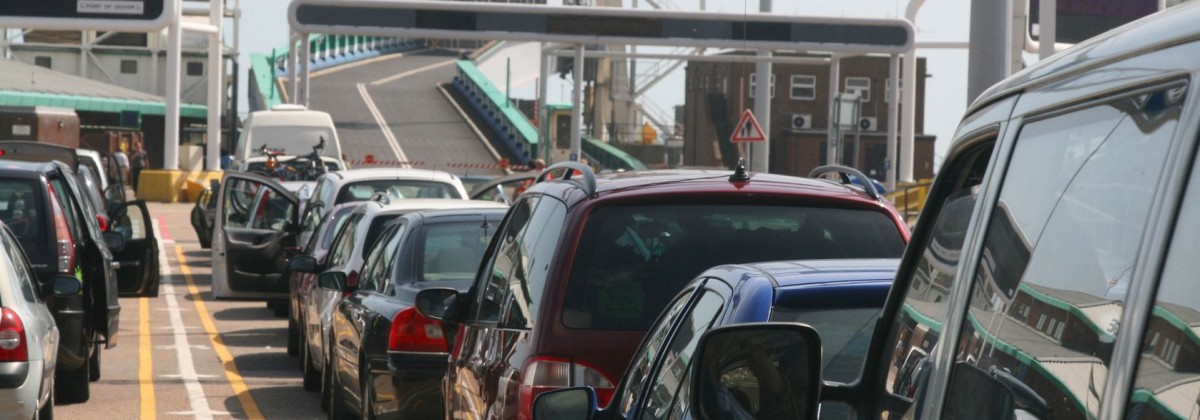The Implications of Brexit for Border Controls in Calais

14 March, 2016
Summary
1. The French government have an option to withdraw from the Treaty at two years notice and might do so under political pressure from the National Front whether or not the UK remains in the EU. On the other hand, they have a clear interest in an unimpeded flow of goods and tourists. They might also fear an even larger flow of migrants to the Calais region.
Introduction
2. The Treaty of Le Touquet[1] was signed in February 2003 and entered into force in February 2004. It establishes the framework for the exercise of frontier controls in the territory of the other party at seaports. This means that UK immigration officers are based in France and French officers operate in the UK.
Context of the Treaty
3. The Treaty builds on the Sangatte Protocol signed in 1993 and an additional Protocol signed in 2000. These two documents established juxtaposed immigration controls to check on a passenger’s right to enter the destination country before they boarded a train between the UK and France.
The Le Touquet Treaty
4. The Treaty of Le Touquet is a bi-lateral treaty between the UK and France which allows the two countries to operate their “frontier controls” from the other state, thus extending juxtaposed controls from the Eurotunnel and Eurostar train services to ferry services. The territorial limits of the Treaty are clear – applying to seaports of both countries on The Channel and North Sea. In practice, however, there are no juxtaposed controls at other French ports (nor in Belgium or Holland).
5. Under the Treaty, UK immigration officials based in France are able to check all passengers seeking to cross on a ferry from France to the UK to ensure that they have the correct documentation. Those without the right to enter the State of Arrival can be denied travel.
6. The situation with regard to asylum seekers is clear in the Treaty. Where an individual makes a claim for asylum in the State of Departure during the controls carried out by the State of Arrival, or until the vessel has departed, the State of Departure is responsible. Once the vessel has departed, the State of Arrival is responsible.[2]
7. The Treaty is not time limited but permits termination to come into effect two years after the date of notification by one of the contracting parties.
Le Touquet and the European Union
8. The Le Touquet Treaty is a bi-lateral treaty between the UK and France, and is completely separate from the European Union. There would, therefore, be no immediate legal implications for the Treaty if the UK were to vote to leave the EU. However, each party can request consultations “with a view to revising the provisions of this Treaty in the light of new circumstances or needs” (Article 23(3]. A British departure from the EU might, of course, constitute such new circumstances.
Le Touquet in the event of a British exit from the EU
9. If the UK were to vote to leave the EU and the French government chose to terminate the agreement, UK immigration officials would no longer be based in France. As a result, passengers would first meet an immigration official upon disembarkation in the UK.
10. However, Section 40 of the Immigration and Asylum Act 1999 imposes penalties on carriers (ships and aircraft) in cases where individuals arrive in the UK without valid entry documents. The penalty is £2,000 per passenger. Carriers therefore have a strong incentive to ensure that only those who have the right to enter the UK embark on their ships or aircraft.
11. When a passenger arrives at a UK port without leave to enter, the authorities can deny entry since passengers have not crossed the border into sovereign territory until they have been granted leave to enter. Such a person can be sent back to the country of departure.
12. However, where a person has arrived without documentation and immediately claims asylum, the UK authorities are obliged to process the application.
13. A Freedom of Information request has revealed that in July 2015 the UK authorities detected almost 13,000 clandestine entry attempts at European ports and train tunnels.[3] This is an increase from around 1,000 detections per month between 2008 and 2012.
The French Response
14. There are a number of reasons why the French might hesitate to terminate the Treaty:
- The Treaty meets a number of French interests (which is why they signed it in the first place). In particular, the route is very important for French commerce and tourism.
- Termination might lead to even larger numbers of migrants congregating around Calais to attempt to cross into Britain with even greater threats to public order.
- The resulting chaos might well have a negative effect on the operations of the Eurostar in which France has a 50% stake.
16. On the other hand, political pressures, including from the National Front, might cause the French to resile from the Treaty in the event of both a vote to leave or to remain.
Footnotes
- The Treaty of Le Touqet, URL: http://blogs.channel4.com/factcheck/wp-content/uploads/sites/9/2016/02/LeTouquetTreaty2003.pdf
- See Article 9.
- Freedom of Information request submitted to the Home Office by The Economist, Britain’s borders see a surge in attempted illegal migration, 8 March 2016, URL: http://www.economist.com/news/britain/21694407-twelvefold-increas… n-referendum-campaign-britainu2019s
- The Treaty of Le Touqet, URL: http://blogs.channel4.com/factcheck/wp-content/uploads/sites/9/2016/02/LeTouquetTreaty2003.pdf
- See Article 9.
- Freedom of Information request submitted to the Home Office by The Economist, Britain’s borders see a surge in attempted illegal migration, 8 March 2016, URL: http://www.economist.com/news/britain/21694407-twelvefold-increas… n-referendum-campaign-britainu2019s
